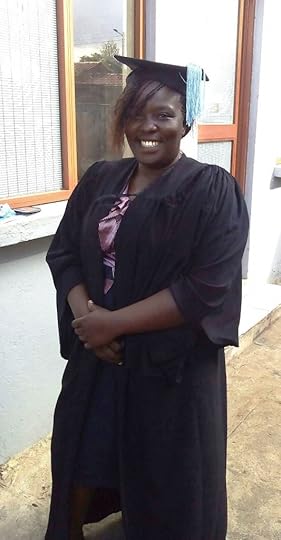Rye Barcott's Blog, page 12
April 19, 2016
Empowering Girls Through Web Design
In our 2015 Annual Report, we interviewed Cynthia and Bernice, 2 students studying web and graphic design at the CFK-Nairobits Girls Center, about how learning computer skills can empower a generation of youth, especially girls. Their underlying message: giving girls equal opportunities to learn, grow, and thrive benefits everyone in their community.
Cynthia and Bernice have since graduated from this program, run in collaboration with Nairobits. Now, we welcome a new cohort of girls with stellar web and graphic design skills! After the ceremony, we caught up with a few of them to hear their thoughts on the course. Check out their responses — and a couple of projects — below.

A personal portfolio project by Toma Ali Bilal. Students at the CFK-Nairobits Girls Center get advice from experts on how to craft an effective website.
What did you expect from the course before you started?
“My expectation was to be taught only Microsoft Office, but I learned much more.” -Quinter
“I wanted to be computer literate but I didn’t know where to start from. By good luck, I asked one of our church members about Nairobits and she told me how to apply.” -Sharon
“I was very eager to learn how to work with computers, and also to meet and make new friends.” -Sheilah
“I expected many challenges and lessons, like how to increase my skills in typing and become a critical, creative thinker. Overall, the program made me feel confident about myself.” -Toma
What was your experience like throughout the course?
“The lessons were sometimes difficult, but with determination and hard work, I know that I have done my best so far.” -Cynthia S.
“I had a wonderful desk mate to my right, and she helped me through this course. Having someone to hold you by the hand and help you begin is a blessing.” -Cynthia A.
“Throughout the class, I had a hard time with design. Working with templates was okay, but coming up with an idea really gave me a headache. But now I’m able to design and blend color on the web.” -Shufaa
“There may be tough times, but the difficulties which you face will make you more determined to achieve your objectives and to win against all odds.” -Victoria

A commercial site for a coffee shop.
What are your goals now that the course is over?
“After the training, I expect to design as many templates as possible, thereby adding to my portfolio.” -Toma
“I want to keep developing my skills. The beautiful thing about learning is that no one can take it away from you.” -Victoria
How can CFK support you and help you achieve your goals?
“Carolina for Kibera can simply support me by always notifying us of opportunities that they have come across.” -Cynthia S.
“If you find someone looking for an intern, please alert us so we can send ourselves there to sharpen our skills!” -Sharon
–
You can support girls eager to master computer skills. Donate today.
Thank You, G.E.!
At Carolina for Kibera, we love receiving visitors. Showing people our work in the Kibera community firsthand is one of the most rewarding experiences for many reasons. It changes hearts and minds, it puts a face to the place, and sometimes it encourages direct investment in community members.

That’s why we were so thankful to spend a day with a team from G.E.-Africa! The team included Sulemana Abubaker, Chief Information Officer; Cynthia Karago, a leader in the Information, Technology, and Leadership program; and many other G.E. staff members eager to find ways to contribute. On their tour of CFK’s programs, the G.E. team visited the CFK-Nairobits Girls Center, where girls learn important technological skills like web and graphic design, and also visited the site of the future Binti Pamoja Girls Center.
Their commitment to girls’ empowerment programs was clear, especially regarding how technology fits into those programs. The visiting team was eager to hear stories shared by women and girls about how access to technology positively impacts their lives and connects them with opportunities. Susan Mueni was one of the young women who shared her story—after sharing her journey to being selected for the Queen’s Young Leaders Programme, they gave her a personal laptop to help make the online leadership course run as smoothy as possible. In fact, they were so impressed with her plans to give back to Kiberan girls that they offered her a one-month internship!

At the end of the day, G.E. extended a generous gesture to CFK by donating 15 laptops for CFK’s technology initiatives for girls. To everyone at G.E., we are truly humbled by your generosity and commitment to fighting urban poverty in Kibera. You are giving Kiberan youth hope. Thank you, G.E.!
April 13, 2016
The Power of a Camera: Cheryl’s Photo Essay
“What happens when girls are empowered to speak for themselves?” This was the central question underlying CFK’s recent collaboration with ARTKIDS Foundation to teach photography classes to girls in our Daughters United program. (You can find more information on our collaboration here.)
The first cohort of young photographers has provided an answer. Each student in our photography training program submitted a story about one facet of their life in Kibera, complete with pictures to add context. The results: an inside look at the Kibera community from girls’ perspectives.
This week, we are featuring Cheryl’s photo essay, “Water in Kibera.” Keep reading for a story and photos that capture the blessings and dangers of water and rain in Kibera.
Water in Kibera
By: Cheryl
Binti Pamoja Photography Training Project
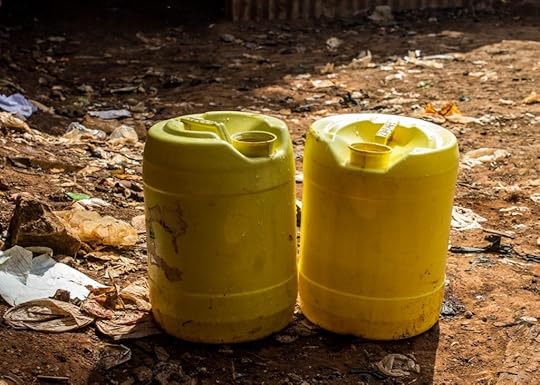
People say that water is life. That is true. What people don’t know is that water has been the cause of many deaths in Kibera.
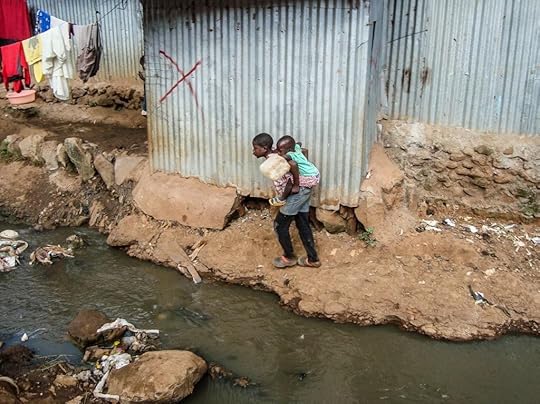
Because of the poor construction, when it rains, the houses fill with water. This brings a lot of danger into people’s lives. Kibera is not only a slum. It is home to many people and different generations. If the water comes and destroys their houses, these people have no place to go.
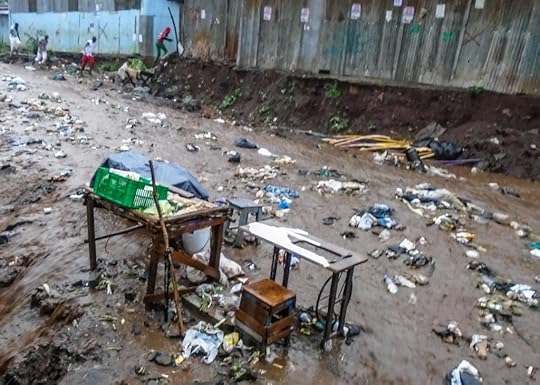

The broken pipes represent a big problem for the community. They put people’s lives in danger. If no one repairs them, they allow dirt to mix with water and people will be consuming water that is contaminated. This leads to the spread of diseases like cholera.
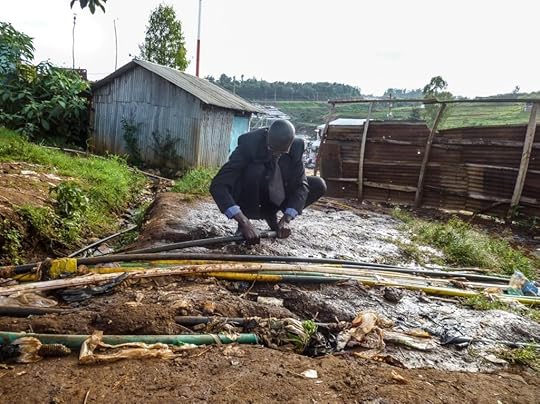
People should learn how to repair broken pipes and how to take care of their environment. Who knows? You could be drinking contaminated water and get sick because you ignored a small thing that can be repaired.
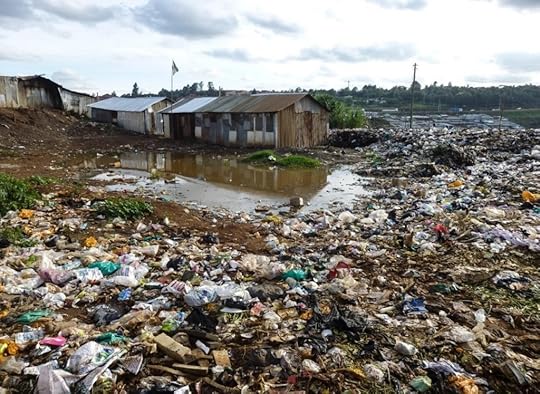
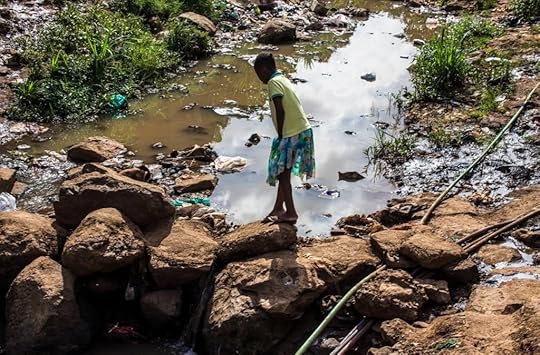
Water is needed for cooking and washing clothes.

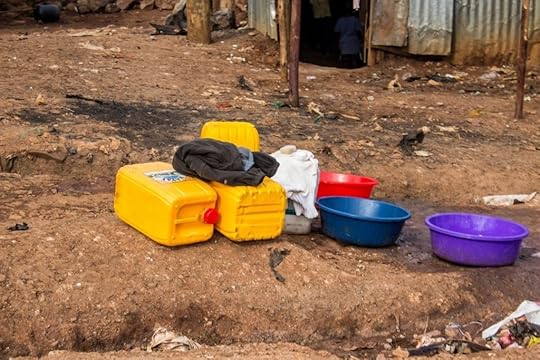
Water is also needed for showering.

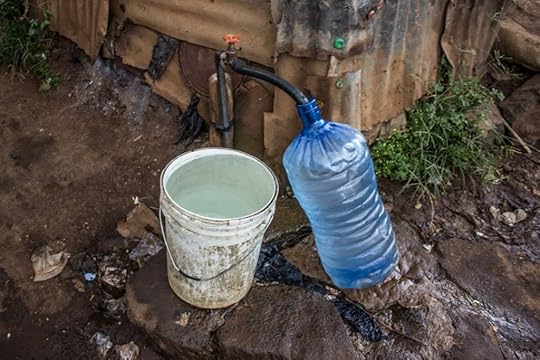
Most parents in Kibera send their children to fetch water and most children enjoy doing this task.
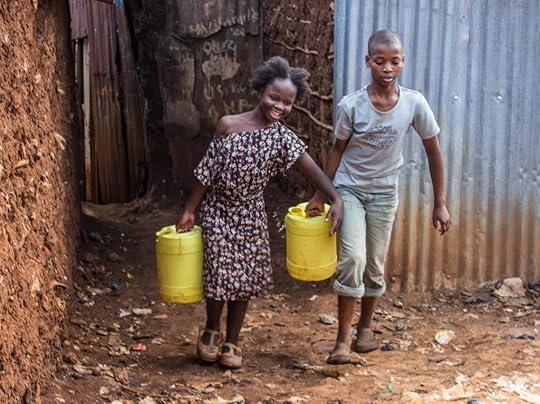
People would be more happy and healthy if they could have access to clean water.
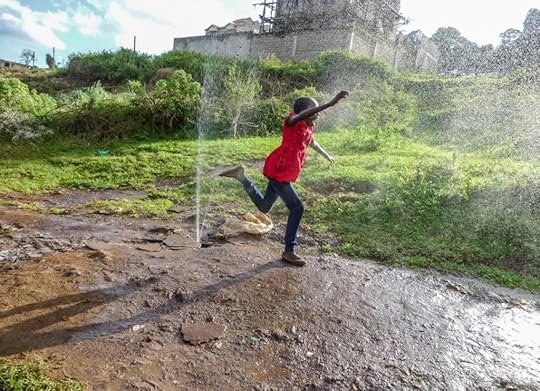
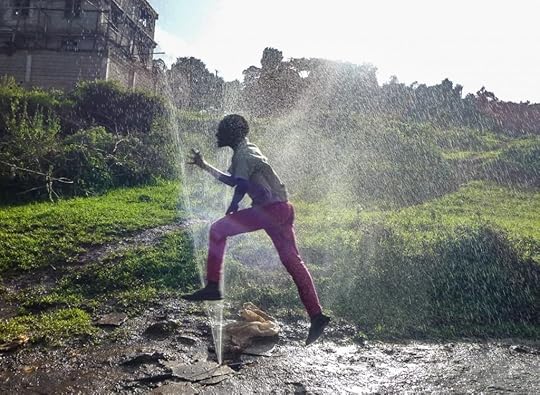
March 4, 2016
Mercy, Scholarship Recipient, Forges Forward
By: Nick Johnson, Communications and Administrative Manager
—
Last year, we introduced you to Mercy Atieno Omondi, a scholarship recipient who is now in her first year at Kenya Medical Training College. There, she is building upon the rudimentary medical skills she already has—with quick wits and steady hands, she once treated a fellow churchgoer’s wound even though she had no formal training. With a scholarship made possible through support from African Kids in Need (AKIN), Mercy is making progress towards her nursing degree and laying the foundation for her career.
Now, Mercy has a message of thanks—to AKIN, to CFK, and to all their supporters. “I am humbled to take this opportunity to discuss how my life is, and my family. However difficult it might seem to be, I am grateful to God for his great help and patience.”![Mercy pic2 [edited]](https://i.gr-assets.com/images/S/compressed.photo.goodreads.com/hostedimages/1457181659i/18329199._SX540_.jpg)
Mercy’s educational journey has been fraught with uncertainty. She is part of a very large family living in poverty—as if this wasn’t enough, Mercy’s family’s home was looted in 2007 during the post-election violence that year. They lost everything and were forced to flee to their hometown of Siaya in Western Kenya. Eventually, the burden of hosting them in Siaya became too much to bear for other members of the family. Mercy explains, “My grandfather wanted to send away my mum and my siblings. It was a very trying moment but now everything is settled.” Things have changed for the better. “Now, my family is doing great and I thank God because there is peace.”
Daily life for Mercy is easier now. She’s always been a goal-oriented person, and now she has the opportunity to work towards her ultimate goal of becoming a nurse. What matters most, she explains, is “knowing what you want in life” and putting in the work it takes to get there.
“I love the kind of life that I live, simple and having great visions and dreams. I am shaped by the experiences I go through and learn from the very simple mistakes so as to be a person of integrity and dignity. This is not an easy task. It is a matter of knowing what you want in life and standing stalwart enough to be a conqueror. I have come very far, and today I see myself continuing to head in the right direction as far as my academics are concerned.
“Living a life of poverty has not been easy, and school life has been a struggle. At times I feel like giving up, but looking at what I know and as God’s child, I forge forward. I try as much as possible not to compromise myself with a lot of things of this world. I thank God for His providence and the heart I have of being contented with what I have, for I know it will only be for a short duration before I achieve my goal of becoming successful in life.”
February 11, 2016
Laurine’s Graduation
By: Nick Johnson, Communications and Administrative Manager
—
Last June, we announced that Laurine Oloo Otawa, one of the first recipients of CFK’s Alan Cross Memorial Scholarship, would be graduating in December 2015. CFK is now proud to announce that Laurine has indeed graduated with a degree in Technology Health Records and Information Technology!
Laurine has been involved with CFK since 2012 when she was first awarded the Alan Cross Memorial Scholarship, which seeks to give students interested in medical-related fields the chance to explore those interests and begin developing their career. Earning a Diploma in any medical field requires diligence and attention to detail, plus a sizable time commitment—but Laurine made it clear that she wanted to work in a place that would fit her interests and career choice, even while she was in school. So, she decided to work at the Tabitha Medical Clinic! She started as a janitor, but slowly began to volunteer her time (on top of her work schedule) by managing several patient records.
Between her new degree and her experience volunteering at the clinic, Laurine became a qualified and competitive candidate for hospitals across Kenya—and even across East Africa. She wrote to us recently, updating us on her whereabouts, career progress, and overall well-being. “I graduated in December, and—believe me—in January, my employer extended my contract to two years. I am currently working at a hospital in Juba, South Sudan. I am working at the health information desk and this has really helped me in gaining more knowledge and skills.”
She also expressed her gratitude for CFK and the Alan Cross family for supporting her. “Thank you so very much, CFK, because without you, I really don’t know where I would be right now. You saw the best in me and you gave me a chance. Thank you, and again thank you. To the Alan Cross family, I really don’t know how to say thank you but I can only pray for your blessings from God. May you continue to change the lives of others.”
Congratulations, Laurine! We wish you well and we are sure we’ll see you again soon.
Corporate Meets Development: Julian Rowa’s First 6 Weeks at CFK
By: Julian Rowa, CFK Executive Director

Julian, 3rd from left, with several members of CFK’s staff at the CFK office in Kibera, Kenya.
It’s been 6 weeks since I joined Carolina for Kibera as Executive Director. So far, I am thrilled by the work being done in the community and am eager to bring some of my experiences and corporate background to the organization. As an entrepreneur and former leader in the finance sector, identifying how to unify my perspective on leadership and CFK’s work has sparked thought-provoking questions and highlighted the organization’s potential for growth.
So, how do I begin to depict my mental journey at CFK? Here goes nothing.
Corporate meets Development, the bottom line meets philanthropy…is this an explosion about to happen? Is there a stark separation of the two worlds or are they powered by the same principles? In the world of commerce, organizations mobilize and create intermediations to offer goods or services, while not-for-profit organizations raise funds from which programs can be designed and delivered. But are these sectors truly different?
Conversely, is the NGO world ready for the corporate mindset? Would this create the change required to bring greater impact in international development? And then the detail-oriented questions: what is sustainability and why does it have different connotations among similar players? How does one measure capacity development which is viewed as a critical success factor?
These are just some of the questions I’ve asked myself, mentors, and peers over the past 6 weeks. Perhaps the biggest question is this: is leadership the panacea to bridging the “imaginary” gaps that have existed between the corporate and development worlds over the years? Leadership is transferable and all that is required is the wit, the wisdom and the courage of its application. I am persuaded that taking a careful corporate approach to CFK’s work will help drive performance and create greater accountability not to mention an unprecedented value addition.
In my 6 weeks as leader of Carolina for Kibera, I have arrived at the considered view that organizations— notwithstanding their sector, DNA or mission—are motivated by one factor “to succeed.” Success is designed and driven by leadership that begs the question, “What do I need to change and why?”
I have focused on 5 factors I consider critical for CFK’s revival and growth. These factors are synonymous with the corporate way of driving organizations, and are as follows:
A focus on company , where revenue is generated, costs are managed and—to sneak in some NGO lingo—funds are raised.
Control , which involves the adoption of a risk mindset to put in place preventive and detective controls that are all subject to monitoring and evaluation.
As for colleagues , it is about getting the best from people through performance contracting, continuity through succession planning and training and development.
Community refers to engagement with the Kibera community to build trust and synergy.
Customer service or confidence-building is the 5th “C” that defines and captures our interaction with those we come into contact with.
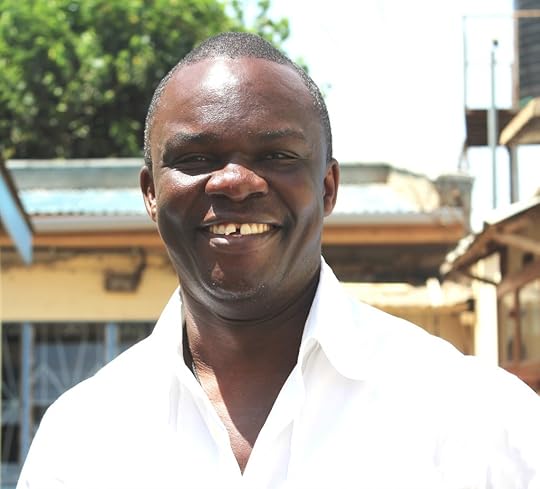 In my short stay, I realize that a lot of good has been achieved. In our aspiration to become world class at what we do and to ensure we exceedingly deliver on our commitment to the community, we have designed an approach from the “5 Cs” pillar to guide our strategy.
In my short stay, I realize that a lot of good has been achieved. In our aspiration to become world class at what we do and to ensure we exceedingly deliver on our commitment to the community, we have designed an approach from the “5 Cs” pillar to guide our strategy.
There is a lot of excitement in the air! The coming weeks will be interesting as I seek to align my thinking with that of our staff, the board, the community and our partners.
I will issue a report card on the status in the next six weeks. I invite you to stay tuned and read along.
Julian Rowa
CFK Executive Director
—
January 14, 2016
CFK Welcomes New Executive Director, Julian Rowa

Rye Barcott, Julian Rowa, Leann Bankoski, and Salim Mohamed together near the Tabitha Clinic in Kibera, January 13, 2016.
Friends and Colleagues:
It’s hard for us to believe that 15 years have passed since we started Carolina For Kibera with our beloved partner, the late Tabitha Atieno Festo. The best parts of our journeys together have brought us deeper into the community with the young leaders who are most impacted by our work. They embody the change that we wish to see in the world. It’s been a special treat for us to spend this week together in Kibera with the young leaders impacted by our programs.
The beginning of 2016 marks an exciting moment in the ongoing growth of CFK. We are moving to a single executive director based in Kenya, further integrating our U.S. and Kenya Boards, and honing our strategic focus on youth, leadership development, and health. Leann Bankoski has completed her time at CFK after seven remarkable years. Her leadership has culminated in stronger collaboration between CFK in the U.S. and Kenya. Leann has accepted an exciting position at an advisory firm in Kenya that seeks to identify, measure, and scale best practices in global development. As Leann often noted, CFK is a family, where the strength of our organization is in the strength of our team. We will miss Leann, and we take comfort in knowing she is nearby and forever part of this family she has so deeply shaped.
In the spirit of the new year, it is particularly exciting to announce a new CFK leader: Julian Rowa, who will serve as the Executive Director of Carolina for Kibera. Julian is an entrepreneur and seasoned businessman who grew up as a boxer in one of Nairobi’s low-income communities. Julian most recently helped lead the successful launch in Rwanda of Equity Bank, a bank that has helped create access to capital for millions of Africans, including those living in many disenfranchised communities. Julian found himself recently at a stage in life where he was looking for a new leadership challenge with potential to make significant impact. At 47 years of age, he is also by the standards of our youth organization a “Mzee,” which translates from Swahili to “old man,” and is a term of high respect. Julian looks forward to meeting with many of you, our partners, and plans to send an update from his first weeks on the job shortly. Welcome, Mzee Julian.
We are excited about what the future brings, and we hope you will join us in wishing Leann well and Julian a warm welcome.
Tuko Pamoja (We are together),
Rye Barcott & Salim Mohamed
Co-Founders, Carolina for Kibera
December 15, 2015
Susan Mueni Is a Queen’s Young Leader!
Susan Mueni is not one to back down from a challenge. When she heard from friends about the Queen’s Young Leaders Programme, a one-year program that recognizes exceptional young leaders from countries of the British Commonwealth, she decided to apply despite knowing she faced some heavy competition. “I was optimistic when applying,” she explains, “though I knew that it’s very competitive because many young leaders from Commonwealth countries bring amazing things.” And her reaction to hearing that she won the award? “I couldn’t believe it,” she says, smiling. “Actually I was in tears—tears of joy.”
Mueni brings many amazing skills, perspectives, and experiences as well. Born and raised in Kibera, Mueni overcame many hardships to get where she is today. She is currently studying to become a teacher, having just finished the prerequisite 1-year certificate course before starting her official degree in education. She is also the Field Coordinator for the girls’ teams in the Sports Association, serving as an as a personal mentor for many. On top of this, she continues to referee soccer matches and lead trainings for teams (you can see her in action from our collaboration with WASH United here).
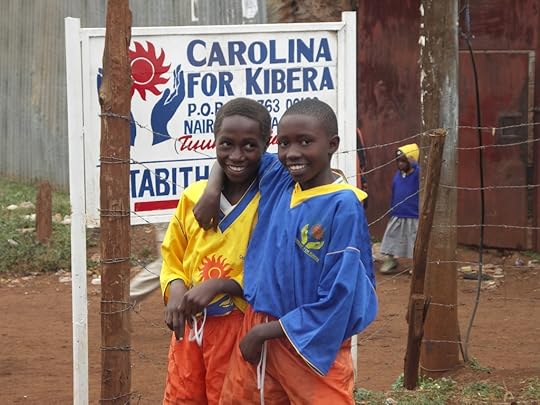
Young Mueni, right, and a friend pose in front of CFK’s office sign.
Mueni began participating in CFK’s programs from a very young age, as a young soccer player in CFK’s Champions League. She appreciated that sports kept her active and busy, and she loved spending time with her teammates. Shortly thereafter, she joined Daughters United for many of the same reasons. Both programs gave her an opportunity to develop her talents as an athlete, friend, mentor, and leader.
These qualities are all things she hopes to build upon through the Queen’s Young Leaders Award. The award package is rich with content on mentorship and networking. Mueni will attend an online leadership course called “Leading Change,” taught by faculty at the University of Cambridge. Perhaps the most exciting part is the 1-week, all-expenses paid residency program in the UK, where Mueni will be presented her award from a highly esteemed figure. “We will receive an award from Her Majesty the Queen,” she announces, and it seems like she still can’t believe it. “I’m so happy and honored to meet Her Majesty. I’m so nervous. I can’t wait to meet her.”
The Queen’s Young Leaders Award holds a core value in common with CFK: it gives young leaders a chance to show what they’re capable of. “Such programs are very important because they show how much potential the youths have if given the opportunity,” explains Mueni. “It motivates young people to do what they do, because at the end of the day, they feel they’ve been appreciated somewhere.”
Mueni hopes to encourage others to follow in her footsteps. “I hope my story will be an inspiration to fellow young people in my community. So at least they know you don’t need a title to be awesome.” She adds, “Being awesome is just doing small things for your community. Show you’re passionate about your community.” With Mueni, there is no question of that.
December 3, 2015
An Interview with Shamira Lukomwa, Former CFK Intern
CFK strives to make connections with students, both in North Carolina and in Nairobi. Luckily for us, Shamira Lukomwa, UNC graduate and former CFK volunteer, got to know CFK both at UNC and abroad.
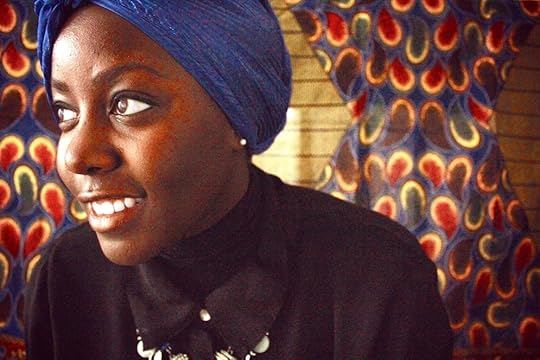 As an undergraduate at UNC, she studied abroad in Nairobi through the School for International Training (SIT). During one of their program excursions, her class visited Carolina for Kibera and was shown around the community, stopping at some CFK points of interest along the way. Her knowledge of Nairobi, Kibera, and CFK—even for a short time—made her a competitive candidate for an internship in CFK’s U.S. office.
As an undergraduate at UNC, she studied abroad in Nairobi through the School for International Training (SIT). During one of their program excursions, her class visited Carolina for Kibera and was shown around the community, stopping at some CFK points of interest along the way. Her knowledge of Nairobi, Kibera, and CFK—even for a short time—made her a competitive candidate for an internship in CFK’s U.S. office.
Now, she’s come full circle once more. After graduating from UNC in 2015 with a B.A. in Global Studies and Communication Studies, Shamira moved back to Nairobi and began looking for jobs. From the beginning, she had her sights set on PAWA 254, a Kenyan organization that blends art and social change advocacy, championing what they call “artivism.” Now she works there full time!
We caught up with Shamira recently, asking her to reflect on her time at CFK and her new life in Nairobi. Check out our conversation below!
CFK Staff: How and why did you get involved with Carolina for Kibera?
Shamira Lukomwa: I heard about Carolina for Kibera in passing during my early years at Carolina, but was formally introduced to CFK while studying abroad with SIT in the fall of 2013. I remember being amazed at how much impact the organization has in Kibera, particularly with the Tabitha Medical Clinic and the Lishe Bora Mtaani Nutrition Centre, and feeling extremely proud to be a Tar Heel. Unfortunately, I missed that year’s fellowship deadline (since I was still abroad). But as luck would have it, I stayed in Chapel Hill that summer for an internship and in the process got to meet the Chapel Hill CFK team. I expressed my interest in CFK and they offered me an internship!
CFK: What led you to choose UNC over other universities?
SL: I applied to a lot of universities—14 to be exact—and all but one were out-of-state (I’m originally from Georgia). UNC was one of the few universities I visited that instantly felt like the right fit. Additionally, I was offered the Covenant Scholarship, which, in conjunction with external scholarships, allowed me to graduate debt-free. I am forever grateful to the Covenant Scholarship because it gave me the freedom to pursue an unconventional post graduation path.
CFK: W hat made your post-graduation path unconventional?
SL: While a lot of my friends ended up relocating nationally for graduate school or work, I decided to relocate internationally without the pull of a job offer or graduate school acceptance. I know it seems wild to some (my parents are partly in that camp) but I wanted the experience of working and living in East Africa. So here I am, navigating and loving life in Nairobi!
CFK: While you were interning at CFK, what projects did you work on? Have those helped you get where you are today?
SL: During the first half of my internship, I mobilized the fellowship campaign and marketed that opportunity around campus. During the second half, I focused on managing the logistics of the annual Soccer Clinic, did a little bit of design work, and learned more about using CRM tools. At CFK, I was encouraged to explore my interests and given the freedom to work in a variety of capacities. I also learned that I thrive best in smaller organizations, where I can have a personal relationship with each of my colleagues. My experience at CFK shaped what company culture and industry I sought out while job hunting.
CFK: Relocating to a different country—on a different continent—can be daunting. What influenced your decision to move to Kenya?
SL: As cliché as it sounds, my study abroad experience was truly one of the best experiences of my life. Less than a month into my program I knew that I had to make my way back to Kenya. My program gave me the opportunity to travel throughout the country, but I enjoyed my time in Nairobi best because of the connections I made and the sheer amount of creativity this city produces. I was offered a summer position to lead experiential learning programs in Uganda and Kenya through Operation Groundswell and instead of returning to the States, I decided to stick around and try my luck at job hunting.
CFK: What has surprised you the most about living and working in Nairobi?
SL: That I haven’t been able to find Sriracha anywhere! I’m (partly) kidding. On a serious note though, I think I’ve been surprised at how small Nairobi starts to feel once you get to know people.
CFK: What has been most meaningful about volunteering with CFK and working for PAWA 254?
The most meaningful part of both is definitely getting to meet the people that have been positively impacted by both organizations. There is something special about being a part of an organization that helps others reach their goals—whether those goals are academic, professional or socioeconomic. Since relocating to Nairobi, I have met so many people who have benefited from CFK in some way. I meet and work with beneficiaries of PAWA every day. Knowing that my time contributes to the success of these efforts, even in some small way, makes it all worth it to me.
—
Hear more about how CFK works with students by following us on social media!
Interested in learning more about PAWA? Like their Facebook page and follow them on Twitter!
November 16, 2015
Against All Odds: How Mercy Overcame Extreme Hardship to Attend University
By: Elizabeth Muthoni, CFK-Kenya Intern
–
![Mercy [cropped]](https://i.gr-assets.com/images/S/compressed.photo.goodreads.com/hostedimages/1447724073i/17042296.jpg) Mercy Odhiambo, a recent CFK scholarship recipient, recalls the exact moment she knew she wanted to work as a healthcare professional. While at church one Sunday, a woman came into church in need of medical assistance for a bleeding wound on her leg. Luckily, Mercy had a rudimentary knowledge of how to help: she got a clean piece of cloth and constructed a makeshift tourniquet, slowing and then stopping the flow of blood. After successfully assisting her, she knew right then that healthcare was her passion. “It gives me pleasure to be able to restore people to their full health,” she explains. “That was just when I knew.”
Mercy Odhiambo, a recent CFK scholarship recipient, recalls the exact moment she knew she wanted to work as a healthcare professional. While at church one Sunday, a woman came into church in need of medical assistance for a bleeding wound on her leg. Luckily, Mercy had a rudimentary knowledge of how to help: she got a clean piece of cloth and constructed a makeshift tourniquet, slowing and then stopping the flow of blood. After successfully assisting her, she knew right then that healthcare was her passion. “It gives me pleasure to be able to restore people to their full health,” she explains. “That was just when I knew.”
Mercy is now a 21-year-old first-year student at Kenya Medical Training College (KMTC). She describes herself as a “resilient and persistent person,” who seeks to be a role model for young girls in her community. Her resilience comes from her history as a resident of Kibera since birth. And her persistence is evident in her fight to stay in school.
Mercy started her schooling at Neema Academy (an informal school in Kibera) and later joined Old Kibera Primary School in 7th grade. From then on, living in poverty made it difficult for her to pay her school fees on a regular basis. Her father, a security guard, and her mother, who doesn’t work, had to take care of their big family of 6 kids and 2 cousins and had little money left over for school. Despite these challenges, Mercy continued to attend, risking getting kicked out for not having paid.
Everything changed during the 2007 post-election violence. Mercy’s family’s home was looted and burnt down, forcing them to flee to their ancestral home in Siaya, located in Western Kenya. While there, Mercy rose above the trauma—she would not let her education be stalled. She joined a different primary school and took her qualifying exams. She passed, earning her a place in a good high school! Once the situation in Nairobi calmed down, her father returned to seek employment; Mercy, being fond of her dad and finding enjoyment in city life, chose to follow him back to Kibera. She stayed with him during the holidays and set out to attend boarding school during the school year.
Due to her family’s economic situation, Mercy faced the same challenges in high school. She was sent home most of the time since she couldn’t pay school fees. At home, she would choose to skip meals because her family could not afford 3 meals in a day. “There was a school term I spent more days at home hungry than in school studying,” she recalls. She laughs lightly to suggest she was stronger than the trials she faced growing up. And it shows—despite lacking funds and daily sustenance, Mercy kept studying, planting seeds for her future ahead. Through her persistent efforts, she managed to earn a B minus in her final exams, which enabled her to gain admission to Kenya Medical Training College!
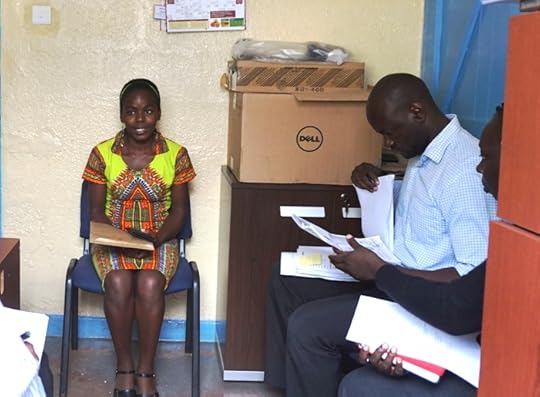
During her scholarship interview, Mercy (left) answers questions from Jeffrey, Education Program Officer, and Stella, Head of CFK’s Economic and Entrepreneurship Department.
Mercy continued to struggle to find funding for school after she graduated from high school in 2012. She spent most of her time volunteering with her church, visiting sick patients and providing them with companionship. During her search, she stumbled across CFK. When our staff met her, they were impressed with her valiant efforts to fundraise for school and to continue studying in spite of hunger and the threat of violence. Her persistence and resilience could not be denied and made her an incredible candidate for a scholarship.
Now, Mercy is grateful that going to school has become easier for her and her family. Over the years since she discovered her passion for healthcare, she has not wavered in her resolve to become a nurse. She is dedicated to serving as a healthcare professional in Kibera, extending affordable healthcare to people who are in need of it but do not have access. If her past is any indication, she will not stop until she has accomplished her goal to the fullest.
Rye Barcott's Blog
- Rye Barcott's profile
- 7 followers


